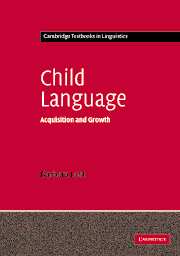Book contents
- Frontmatter
- Contents
- List of figures
- List of tables
- Preface
- Acknowledgements
- 1 The Growth of language
- 2 What is acquired?
- 3 What is the problem of language acquisition?
- 4 How we can construct a theory of language acquisition
- 5 Brain and language development
- 6 The nature of nurture
- 7 How can we tell what children know? Methods for the study of language acquisition
- 8 The acquisition of phonology
- 9 The acquisition of syntax
- 10 The acquisition of semantics
- 11 On the nature of language growth
- 12 Conclusions: toward an integrated theory of language acquisition
- Appendices
- 1 Developmental milestones in motor and language development (adapted from Lenneberg 1967)
- 2a Developmental milestones in infant speech perception
- 2b Examples of sound distinctions perceived by infants
- 3 Developmental milestones in infant speech production
- 4 Developmental milestones in infant syntax: perception
- 5 Developmental milestones in infant syntax: production
- 6 Developmental milestones in infant semantics
- 7 Abbreviations and notations
- Glossary
- References
- Author index
- Subject index
10 - The acquisition of semantics
Published online by Cambridge University Press: 05 June 2012
- Frontmatter
- Contents
- List of figures
- List of tables
- Preface
- Acknowledgements
- 1 The Growth of language
- 2 What is acquired?
- 3 What is the problem of language acquisition?
- 4 How we can construct a theory of language acquisition
- 5 Brain and language development
- 6 The nature of nurture
- 7 How can we tell what children know? Methods for the study of language acquisition
- 8 The acquisition of phonology
- 9 The acquisition of syntax
- 10 The acquisition of semantics
- 11 On the nature of language growth
- 12 Conclusions: toward an integrated theory of language acquisition
- Appendices
- 1 Developmental milestones in motor and language development (adapted from Lenneberg 1967)
- 2a Developmental milestones in infant speech perception
- 2b Examples of sound distinctions perceived by infants
- 3 Developmental milestones in infant speech production
- 4 Developmental milestones in infant syntax: perception
- 5 Developmental milestones in infant syntax: production
- 6 Developmental milestones in infant semantics
- 7 Abbreviations and notations
- Glossary
- References
- Author index
- Subject index
Summary
Introduction
As we saw in chapter 2, unless children can “say what they mean” and “mean what they say” they have not acquired language. Children must bring all their computational power for syntax and phonology to bear on the expression and comprehension of a potentially infinite set of thoughts, beliefs, hopes and desires. In formal terms, the Language Faculty must include a “conceptual interface” (figure 2.1). Our investigation must include semantics: the study of meaning which is linguistically encoded. It must include study of how children link cognitive concepts and ideas (both their own and those of others) to those meanings which are linguistically coded. This linking requires “powerful inferential capabilities” involving pragmatics, the study of language use. (Carston 2002 provides overview.)
Meanings are not provided by the environment (chapter 3); children must create them. Unlike the acquisition of syntax and phonology, the acquisition of the semantic dimension of language knowledge will continue throughout life (see appendix 6 for summary of developmental milestones).
What must children acquire?
Children must:
(A) Discover the units, not only breaking the speech stream into words, e.g., (1), but interpreting them. Although (1) is parsed into units, and it isolates potential words in (a) and words and functional categories in (b), it remains meaningless.
Information
- Type
- Chapter
- Information
- Child LanguageAcquisition and Growth, pp. 219 - 241Publisher: Cambridge University PressPrint publication year: 2006
